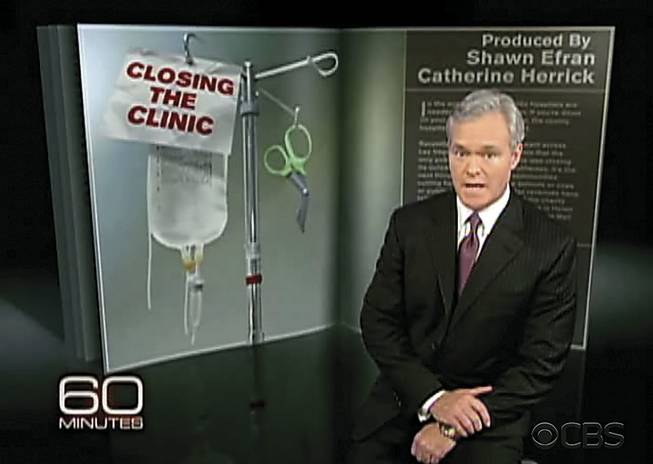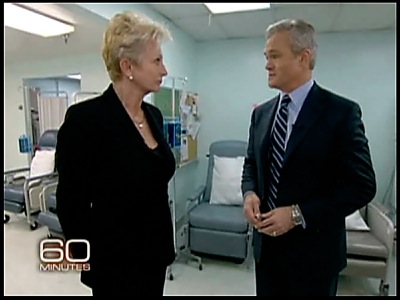
CBS
“60 Minutes” featured the closing of the center Sunday, and though some say the program brought awareness, others are chagrined by the negative publicity for the city.
Thursday, April 9, 2009 | 2 a.m.
In Today's Sun
Related story
Sun Archives
- Health care for all Nevadans (1-31-2008)
- Deal could save hospital money, raise profile (11-20-2007)
- Society's lost souls become UMC's John and Jane Does (11-23-2006)
Sun Coverage
Beyond the Sun
It was yet another national embarrassment for Las Vegas health care when the closure of University Medical Center’s outpatient cancer unit was spotlighted on “60 Minutes.”
The renowned CBS-TV news program dramatically told the story Sunday of how several patients are being consumed by cancer because they are uninsured and can’t get treatment at UMC. The public hospital shuttered its outpatient cancer unit in November after severe state budget cuts. Other cancer clinics in town won’t take nonpaying patients because the chemotherapy drugs are too expensive.
The news show set the stage for hearings Monday and Wednesday in the state Assembly’s health and human services committee, where legislators are considering a bill that would require UMC to reopen its outpatient cancer center to treat indigent patients.
Wednesday’s hearing revealed several absurdities.
The first: Legislators criticized the immoral nature of leaving cancer patients without care without taking any responsibility for the crisis.
“Unacceptable,” Assemblywoman Sheila Leslie, D-Reno, told UMC CEO Kathy Silver in discussing the closure. “I just could not have made that decision and lived with myself.”
Silver noted Wednesday the county hospital was on pace to lose $51 million late last year when the Legislature made emergency cuts that resulted in an additional $21 million shortfall. UMC was left with no good options and had to make brutal reductions to stay afloat, she said.
Hospital officials decided to shutter the program because outpatient cancer services were available elsewhere in the city. (UMC’s letter to patients announcing the change was either dangerously ignorant or disingenuous when it listed other cancer providers they could contact for services. It should have been known the providers most likely would not take uninsured patients.)
The second absurdity: Assembly Bill 433, as it’s currently written, would require the county hospital to provide cancer care only for indigent patients. But the indigent patients, if they are residents of Clark County, are not the ones going without care. Clark County pays doctors to provide indigent outpatient care.
“The poor are getting care. The rich are getting care. The middle class are not,” Silver said, referring to people in the middle class who have no insurance.
The fact that the proposed legislation would only mandate that UMC provide care for patients who are being treated — and would not help those who are not — went unspoken during the hearing.
The third absurdity: Health care experts say cutting UMC’s outpatient cancer clinic is not only inhumane, it will likely cost more when those patients reach advanced stages of the disease, and the hospital will be forced by law to admit them. By then they will be more costly to treat than cancer outpatients.
“Just like any disease, it’s usually a lot cheaper to treat it on the front end,” Rick Plummer, UMC’s spokesman, said. “The bigger reason (to close the outpatient cancer unit) is that outpatient really shouldn’t be done in a hospital anyway. It was one of those services that are widely available elsewhere in the community.”
Plus, Plummer added, the patients may not come back to UMC when the disease becomes more advanced.
Silver and Justine Harrison, vice president and general counsel for the Nevada Cancer Institute, said at the end of the hearing that discussions are under way to resolve the immediate crisis at UMC.
Harrison told legislators that the problems need to be examined “so this crisis does not repeat itself in the future.”
The Assembly committee did not take any action on the bill, which will die if no action is taken by Friday.
The “60 Minutes” program was invoked throughout the hearing, with DVD copies of the show being distributed Monday by one committee member.
Lisa Stark, a Nevada Cancer Institute spokeswoman, said in an interview it was important to bring the “tragic story” to a national audience to show the effects of the budget crisis.
“This was certainly not a happy story or a positive story, but we thought it was an important one to bring the issue to the fore,” she said.
Tom McCoy, government relations director for Nevada for the American Cancer Society’s Cancer Action Network, testified in favor of the Assembly bill and thinks UMC should provide outpatient cancer care. He said “60 Minutes” helped bring the issue to the forefront, but acknowledged that the state is facing a severe budget shortfall, estimated at up to $2.8 billion.
“It’s easy to talk about this,” McCoy said. “But somebody’s got to pay for it.”
But the program will be a setback for recruiting companies to Las Vegas, said Somer Hollingsworth, president and CEO of the Nevada Development Authority. UMC should have kept its mouth shut when “60 Minutes” came calling, he said.
“I just unequivocally would have said: ‘No, I’m not talking to you.’ It’s not a story that needs to come out nationally,” Hollingsworth said.
Hollingsworth said he’s still answering questions about the medical malpractice crisis five years ago and the hepatitis C crisis last year.
And now the “60 Minutes” segment.
“It’s almost impossible to counter that,” he said. “You don’t have enough marketing money to go out nationally and say we have great doctors and it’s a wonderful place to be.”


Join the Discussion:
Check this out for a full explanation of our conversion to the LiveFyre commenting system and instructions on how to sign up for an account.
Full comments policy